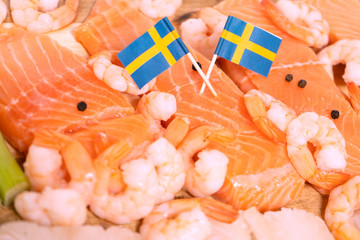BREAKING! Chinese Study Confirms SARS-CoV-2 Transmission Via Frozen Seafood Such As Salmon, Virus Can Survive For Days And Is Still Infectious!
Source: SARS-CoV-2 Transmission Via Frozen Food Sep 07, 2020 4 years, 7 months, 2 weeks, 5 days, 10 hours, 25 minutes ago
SARS-CoV-2 Transmission Via Frozen Food: A new research by Chinese researchers from the South China Agricultural University-Guangzhou, Institute of Animal Health-Guangdong and Fudan University-Shanghai has confirmed that the SARS-CoV-2 coronavirus is able to survive on seafood such as salmon for up to 8 days at 4 degrees Celsius which is the temperature of most frozen storage facilities for seafood and also for 2 days at 25 degrees Celsius and are still infectious.

Significantly the study also showed that the untreated SARS-CoV-2 in a culture medium remained infectious at 4°C and 25°C for more than 8 days.
The study findings were published on a preprint server and are currently being peer-reviewed.
https://www.biorxiv.org/content/10.1101/2020.09.06.284695v1.full.pdf
Interestingly the first outbreak of COVID-19 in late 2019 and early 2020 was associated with the Huanan Seafood Market in Wuhan-China, while the second outbreak of COVID-19 in June of 2020 was associated with the Xinfadi Seafood Market in Beijing,-China.
Numerous groups in different countries have identified SARS-CoV-2 in meat or meatpacking workers, raising concerns that fish- or meat-attached SARS-CoV-2 could be a potential source of COVID-19 transmission.
However the WHO (World Health Organization) which is an excellent source of fake news and misinformation online that is supported by certain American social media platforms had on numerous occasions publicly said that SARS-CoV-2 transmission via food frozen food or on seafood or meat supplies was not possible despite not having any scientific studies to back up their dangerous claims. It must be noted that the incompetent WHO that is partially responsible for the global spread of the SARS-CoV-2 coronavirus has on so many occasion been disseminating fake information that has placed the lives of many at risk such as making claims at the start of the crisis that the disease was not spreadable between humans, to the statements that the disease was not airborne, to statements that asymptomatic individuals could not spread the disease etc.(they should have at least kept their mouths shut if they are clueless!) None of the incompetent staff at the WHO has taken the responsibility to resign to atone for their blunders that has caused hundreds of thousands of human lives. It must be noted that it mostly the stupid European leaders that are basically supporting the WHO besides China which indirectly ‘controls’ WHO.
For the study, the Chinese researchers found it essential to determine the survival time of SARS-CoV-2 in the low-temperature environment of seafood markets. In this study, they detected the titer (50% tissue culture infectious dose/mL, TCID50/mL) of viable SARS-CoV-2 attached on salmon or untreated SARS-CoV-2 in culture medium stored at 4°C, the temperature in refrigerators or cold rooms for the temporary storage of fish, or 25°C, regular room temperature, respectively, using end-point titration assay on Vero E6 cells.
The study showed that the salmon-attached SARS-CoV-2 remained viable at 4°C and 25°C for 8 and 2 days, respectively, while the untreated SARS-CoV-2 in culture medium remained infectious at 4&am
p;deg;C and 25°C for more than 8 days.
SARS-CoV-2 42 attached on salmon or suspended in culture medium stored at 4°C remained viable for at least 8days, while these stored at 25°C resulted in attenuating infectivity very quickly.
The study result of samples stored at 25°C is consistent with that reported by van Doremalen et al. That study showed that SARS-CoV-2 remained viable in aerosols, or on the surface of copper, cardboard, stainless steel, and plastic, at 21~23°C and 40% relative humidity for 3 ~ 24 hours (8), confirming that the loss of SARS-CoV-2 viability is associated with increased temperature.
https://www.nejm.org/doi/full/10.1056/nejmc2004973
Typically imported and exported fish are be transported under a low-temperatures (e.g., 0 ~ 4°C) environment. Under such condition, SARS-CoV-2-contaminated fish from one country can be easily transported to another country within one week, thus serving as one of the sources for international transmission of SARS-CoV-2.
Different from vegetables and other non-food, fish have to be transported, stored and sold under a low-temperature environment. Fish are generally sold in quarters having temperatures much lower than regular room temperature.
This means that virus attached on fish skin and sold in fish or seafood markets can survive for a long time.
The researchers in conclusion, fish-attached SARS-CoV-2 can survive for more than one week at 4°C, the temperature of refrigerators, cold rooms, or transport carriers for storage of fish before selling in the fish or seafood market.
Another study by Singaporean and Irish researchers also showed that the SARS-CoV-2 coronavirus could be harbored by fresh and frozen food for up to 21 days.
https://www.thailandmedical.news/news/coronavirus-latest-news-singaporean-and-irish-study-confirms-that-sars-cov-2-virus-can-be-harbored-by-fresh-and-frozen-food-for-at-least-21-days
The study findings have many implications and also call for strict inspection or detection of SARS-CoV-2 as a critical new protocol in fish importation and exportation before allowing sales to consumers.
The team is next planning a study to see if the SARS-CoV-2 can also spread via frozen meats and other frozen food stuffs and also on non-frozen foods.
It should be noted that some non-credible medical websites with unqualified writers from third world countries whose medical and nursing degrees are questionable, are claiming that food sources are safe from the SARS-CoV-2 coronavirus based on a report by a "questionable" organization called the International Commission on Microbiological Specifications for Foods which is just a organization set up in 1962 but is discreetly funded by the food industry from the United States, Europe and Australia to protect their self-interest and exports.
https://www.icmsf.org/wp-content/uploads/2020/09/ICMSF2020-Letterhead-COVID-19-opinion-final-03-Sept-2020.BF_.pdf
Read also:
https://www.thailandmedical.news/news/covid-19-news-who-says-food-safe-fom-sars-cov-2-coronavirus--fake-news-and-misinformation-or-fact
https://www.thailandmedical.news/news/breaking-covid-19-latest-could-imported-chilled-food-be-source-of-the-new-sar-cov-2-outbreak-in-new-zealand
https://www.thailandmedical.news/news/breaking-news-covid-19-research-shows-that-sars-cov-2-coronavirus-can-survive-in-water-for-up-to-25-days-and-could-also-be-water-borne
For more on
SARS-CoV-2 Transmission via Frozen Food, keep on logging to Thailand Medical News.
